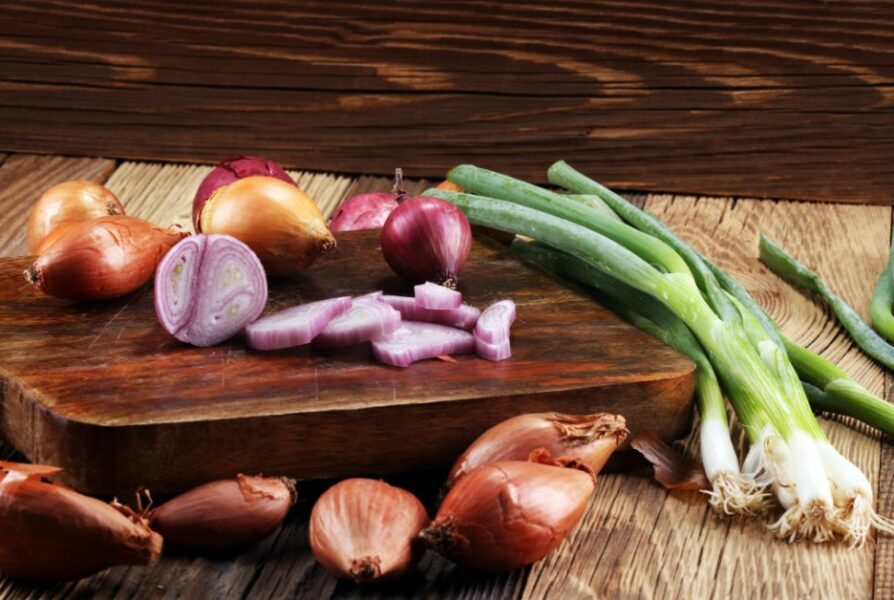Onions are a staple in many kitchens around the world, and for good reason. They add flavour and depth to countless dishes, but their benefits go far beyond taste. This humble vegetable is packed with nutrients that can contribute to a healthy lifestyle. In this blog, we’ll delve into the nutiritonal magic of onions, explore their historical use as medicine, debunk some popular myths (including the trendy “onion water”), and tackle the common concern of onion-induced bad breath with practical solutions.
The Nutritional Powerhouse: Onions
Onions are low in calories yet surprisingly high in essential nutrients. A 100-gram serving of raw onion provides:
- Calories: 40
- Carbohydrates: 9 grams
- Protein: 1.1 grams
- Fat: 0.1 grams
- Fibre: 1.7 grams
- Vitamin C: 12% of the recommended intake
- Vitamin B6: 5% of the recommended intake
- Folate: 5% of the recommended intake
- Potassium: 4% of the recommended intake
- Manganese: 3% of the recommended intake
These nutrients play a vital role in maintaining overall health. For example, vitamin C is a powerful antioxidant that supports the immune system, while fibre aids in digestion.
Health Benefits of Onions
Boosting Immunity
The high vitamin C content in onions is crucial for a strong immune system. Vitamin C stimulates the production of white blood cells, which are essential for fighting infections and diseases.
Anti-Inflammatory Properties
Onions contain antioxidants like quercetin and sulphur compounds that have anti-inflammatory effects. These compounds help reduce inflammation in the body, potentially lowering the risk of chronic diseases such as heart disease and arthritis.
Heart Health
The antioxidants in onions also promote heart health by reducing high blood pressure and preventing the formation of blood clots. Additionally, the presence of sulphur compounds can help lower cholesterol levels.
Bone Health
Onions are a good source of manganese, which is important for bone health. Regular consumption of onions can help improve bone density and reduce the risk of fractures.
Onions in Historical Medicine
Historically, onions have been used for their medicinal properties for thousands of years. Ancient Egyptians revered onions, believing they symbolised eternal life. They used onions in various forms, from food to medicine. In ancient Greece, athletes consumed large quantities of onions to “lighten the balance of blood.” During the Middle Ages, onions were prescribed to alleviate headaches, snakebites, and hair loss and feature strongly in Traditional Chinese Medicine

Debunking Onion Myths
The Onion Water Trend
One of the recent trends on social media platforms like TikTok is the consumption of “onion water,” which involves soaking raw onion slices in water and drinking it, claiming that onion water can cure colds, improve hair growth, and even detoxify the body. However, there is little scientific evidence to support these claims.
While onions are undoubtedly healthy, there is no magical property in onion water that would provide benefits beyond what you get from eating onions in your regular diet. It’s always better to consume the whole vegetable to get all the nutrients and fibre it offers.
Onions and Bad Breath
One of the most common complaints about onions is the unpleasant breath they can cause. The culprit behind onion breath is sulphur compounds, particularly allyl methyl sulphide, which is absorbed into the bloodstream and released through the lungs when you breathe out.
How to Combat Onion Breath
If you love onions but dread the lingering breath, here are some effective strategies to manage it:
Brush and Floss
Brushing your teeth and flossing after eating onions can help remove the sulphur compounds from your mouth. Be sure to brush your tongue as well, as it can harbour these compounds.
Drink Green Tea
Green tea contains polyphenols that can help neutralise the sulphur compounds responsible for bad breath. Sipping green tea after a meal with onions can reduce the odour.
Eat Fresh Herbs
Chewing on fresh herbs like parsley, mint, or coriander can help mask onion breath. These herbs contain chlorophyll, which has deodorising properties. People from India often chew on cardamom pods, which are also said to neutralise the bad smell.
Drink Milk
Drinking milk can reduce onion breath significantly. The fat in milk neutralises sulphur compounds, making your breath fresher.
Chew Sugar-Free Gum
Chewing sugar-free gum stimulates saliva production, which helps wash away food particles and bacteria from your mouth. Choose a gum with a strong mint flavour for the best results.
Embrace Local Produce
Shopping local supports local farmers and independent shops and ensures that you’re getting the freshest, most nutritious onions available. In Neath we have the historic Neath Market which has been serving the community for centuries and remains a vibrant hub. Buying your onions from Neath Market means you’re supporting local businesses and enjoying produce that hasn’t travelled far to reach your plate.
Local Farmers’ Markets
In addition to Neath Market, several farmers’ markets have become more popular in the surrounding area offer a fantastic selection of locally grown food. These markets are perfect for finding fresh, seasonal produce while enjoying a lovely day out!
Conclusion
Onions are a nutritional powerhouse that can contribute significantly to your overall health. They have been used in traditional medicine for centuries, thanks to their myriad health benefits. While some modern trends, like drinking onion water, may not have scientific backing, incorporating onions into your diet in their whole form is a great way to reap their benefits.
If you’re concerned about onion breath, simple strategies like brushing your teeth, drinking green tea, and chewing fresh herbs can help keep it under control. Embrace the many benefits of onions and enjoy them as part of a balanced, healthy diet.
Shopping locally at places like Neath Market ensures you get the freshest produce while supporting your community. So next time you’re in Neath, visit the market and pick up some fresh onions to enhance your meals and your health.
References
- Harvard T.H. Chan School of Public Health. Onions.
- Nutrition.org.uk. Onions: Health Benefits and Culinary Uses.
- Mayo Clinic. Healthy Lifestyle: Nutrition and Healthy Eating.
- NHS. Live Well: Eat Well.
- National Institute of Diabetes and Digestive and Kidney Diseases. Diet and Nutrition.
Disclaimer
Our blog posts are dispensed to inform and empower. We believe in self-care and support in person at our Neath branches. If you cannot access us, please consult with a healthcare professional before making any changes to your diet or lifestyle.


